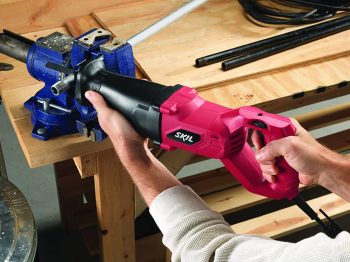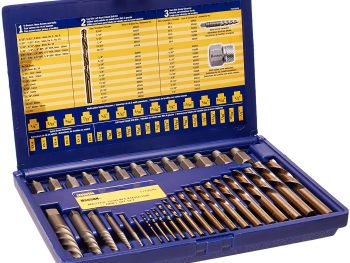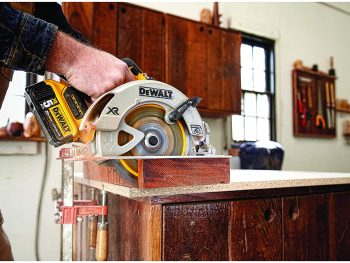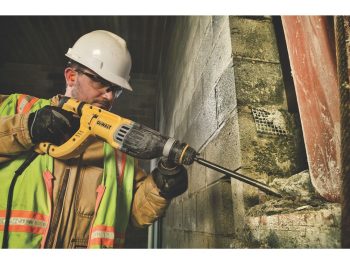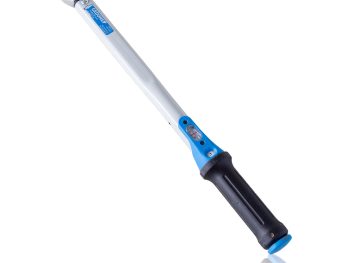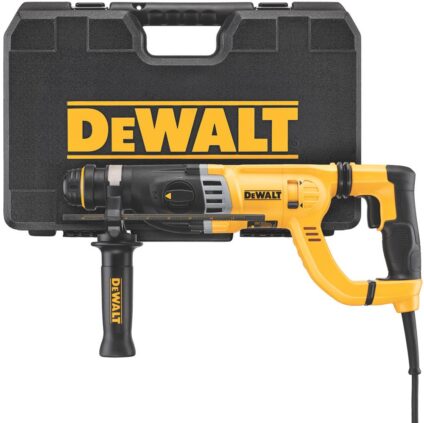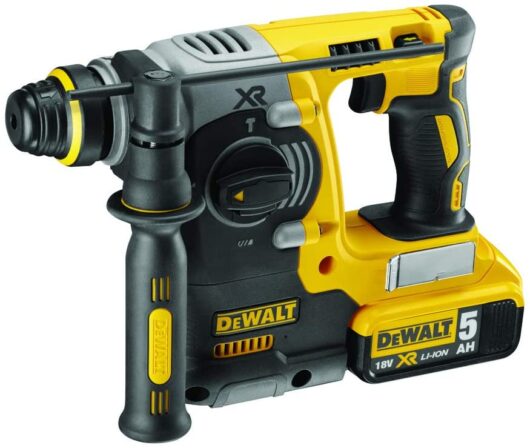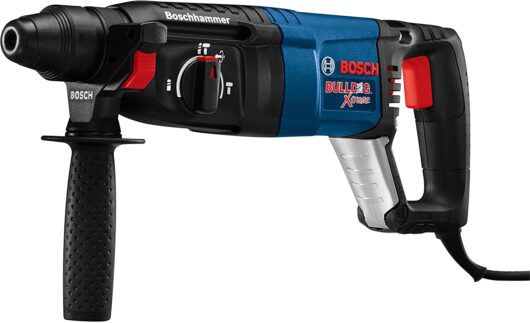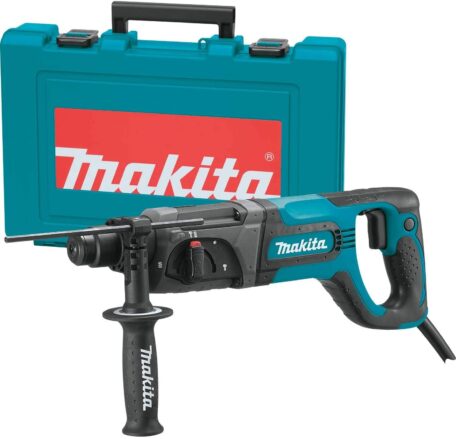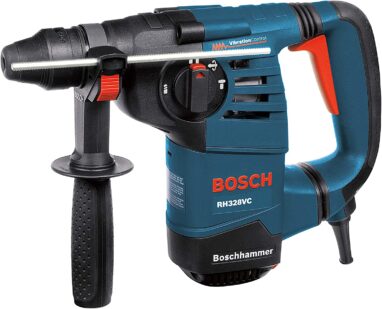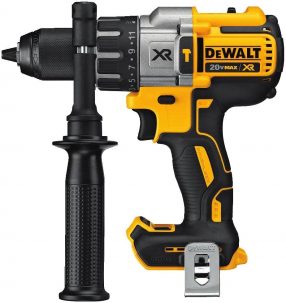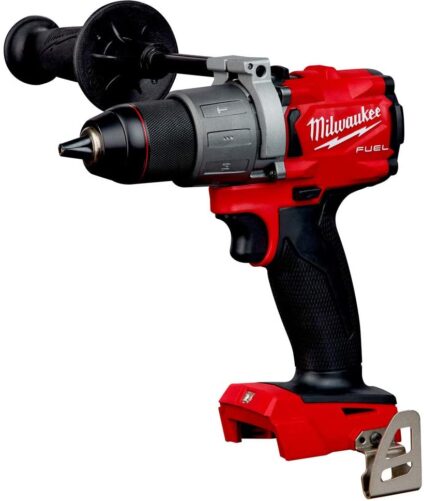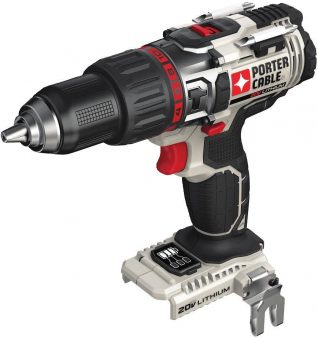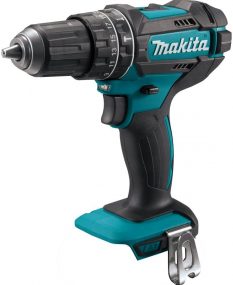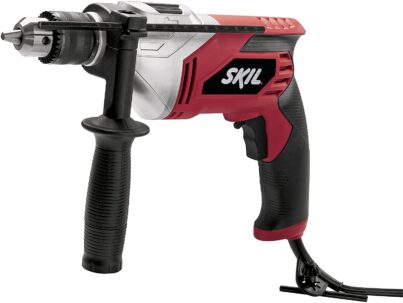Best Hammer Drill - Top 10 Rankings
Affiliate disclosure: Handy Tool Adviser is reader supported. When you buy through our links, we receive a small commission at no additional cost to you.
Whether you are a professional contractor drilling holes into concrete all day long in your job or a homeowner looking to remodel your bathroom with new tiles after removing the old ones, a hammer drill is either your necessity or a lifesaver to make your work much easier.
With so many competing brands and models available in the market, it becomes a hard choice to select the best hammer drill for your application. This is what today’s post is all about.
We compare different models and brands to find the best hammer drill in overall performance, utility and features as well as identifying specialty of each one for a particular application such as concrete drilling, tile removal, home use and DIY use.
Ranking the 10 Best Hammer Drills
Our top ten list and ratings for the best hammer drill is based on a combination of parameters including power, performance, compactness, safety features, ergonomic features, manufacturer’s support and variety in utility. So without further due, let’s begin.
1
Dewalt D25263K
Overall Best | Best Hammer Drill for Demolition
Our Rating: 9.7 / 10
The Dewalt Rotary Hammer Drill D25263K (Corded) is a high performance rotary hammer drill that features three modes of operation i.e. Drill only, Hammer drilling and Hammer only. It is an SDS+ hammer drill powered by an 8.5 Amp brushed motor running the tool at 1450 RPM to give 5,350 blows per minute delivering 3.0 Joules of impact energy in each blow to the ground.
It has an optimum concrete drilling capacity of up to 3/4” and a maximum masonry drilling capacity of 1-1/8”. It cannot be declared a compact tool because of relatively large length of 17.5”, however, the power it packs in 6.8 lbs of tool weight is admirable as there are heavier tools out there with lesser power and performance.
It is built for professional drilling, hammer drilling, screwdriving and chipping applications in tough jobs. From removing old concrete from a boundary wall to demolition of concrete and tile flooring, and even breaking down an entire house of brick, this tool will hammer any job.
Break up rocky soil, breakdown a concrete step, demolish a pillar, drill anchor bolt holes in concrete or any other holes in your basement slabs or remove ceramic tile, thinset and linoleium from your bathroom floor using the power of this tool. Or maybe you prefer using the tool for your hobby of shaping and drilling Pocono sandstones. This tool has versatile utilities.
It is simply the Best Hammer Drill for Concrete, stucco, stone, granite or whatever tough job you throw at it from drilling into concrete walls and driving ground rods to tile removal.
Pros
Compromises
2
Dewalt DCH273B
The Best Cordless Hammer Drill
Our Rating: 9.6 / 10
The DCH273B is a 20 Volt MAX (and 18 Volt nominal) battery operated rotary hammer drill by Dewalt featuring an SDS+ chuck driven by a brushless motor running the tool at 1100 RPM and giving 4600 blows per minute to the job delivering 2.1 Joules of impact energy per blow.
With an optimal concrete drilling capacity up to 1/2” and a max. capacity of 1”, it features three modes of operation i.e. Drill, Hammer Drill and Chip (hammer only) catering to wide range of applications including drilling into cement, concrete and brick; screwdriving anchor bolts and Tapcon screws into concrete as well as chipping and chiseling stone when fitted with a solid SDS+ chisel bit.
This hammer drill will drill through masonry as if it were a wooden wall. From drilling hole into solid 9-inch concrete floor to anchoring a fence post to a boulder or drilling holes in frozen ground during winter for sign stakes, this hammer drill will get the job done perfectly. That slab drain extension project will also be a breeze.
It will drill holes into rebar, masonry, stone and heavy aggregate concrete like a beast while remaining impressive for demolition as well. We consider it to be the best cordless hammer drill in the competition due to its formidable combination of professional performance and great portability. However, battery and charger are sold separately by Dewalt.
Pros
Compromises
3
Bosch Bulldog Xtreme 11255VSR
Excellent All Rounder
Our Rating: 9.5 / 10
Bosch names its corded model 11255VSR as rotary hammer instead of a hammer drill, however, it features all three operation modes i.e. Drill only, Hammer drill and Hammer only. Its SDS+ chuck is driven at 1300 RPM by an 8 Amp brushed motor to give 5800 blows per minute to the job delivering an impact energy of around 2.71 Joules in each blow.
With a max. hole dia. capacity of 1/2” for steel and 1” for concrete, it is a high torque tool intended for drilling into concrete slabs, cemented pavements, stones, rocks, brick walls, cinder blocks and can even handle light drilling into asphalt. It is ideal tool for driving tapcon screws and setting concrete anchors with no compromise in performance on tile removal and chiseling hard materials.
From drilling holes into cinderblocks, concrete, brick and mortar to removing tiles and grout, this hammer drill offers great power and versatility. From being used by the IT Tech Support guys to mount outdoor devices onto concrete walls to being used by an electrician to install an electrical box over brick, this tool is used in diverse applications.
Maybe you are a homeowner trying to remove Chattahoochee rock from over several hundred square feet of stamped concrete patio (a tricky job), this tool will get it done.
This tool is not on rank 1 in our list only because Bosch warrants this tool for 1 year while competitors are giving 3 to 5 Year warranties. However, Bosch’s quality has its own reputation among power tool users that compensates for a relatively shorter warranty period.
Pros
Compromises
Tidbit
We've been using the term SDS above. SDS stands for “Slotted Drive System”. SDS refers to a chuck and drill bit system originally developed by Bosch in 1975. It is specially designed for drilling into concrete and masonry. SDS drill bits fit inside SDS chucks only. Hammer drills that have SDS in their name indicates that they have SDS chucks and use SDS drill bits. SDS-plus and SDS-Max (as well as other variations) refer to improvements in SDS technology.
4
Makita HR2475
Most Compact Hammer Drill - Great Power to Size Ratio
Our Rating: 9.4 / 10
Makita HR2475 is a corded rotary hammer with all three operation modes i.e. Drill, Hammer drill and Hammer only. It supports SDS+ bits with concrete drilling capacity of 1” max. and 1/2” optimal.
Powered by a 7 Amp brushed motor, it runs at 1100 RPM to give 4500 blows per minute delivering 2.7 Joules of impact energy to the job.
The specialty of this tool is the amazing power it packs in the most compact tool design. With a tool length of only 4.37”, it drills through concrete; chisels rocks and stones without a problem.
Whether its concrete blocks, poured concrete, 40-years old concrete or 1-year old concrete, this hammer drill will drill like a pro. So don't hesitate in buying this tool if you're looking to drill into your garage floor.
Its performance in demolition and chipping is also commendable. From chipping out boat anchor sized eye bolts from concrete, pulling tile floors, shower pans and counter tops to breaking up 3-4 ton boulders, this hammer drill won't let you down.
Despite having no active vibration control, its vibrations are not a source of inconvenience to the operator. The main shortcomings we found in the tool were its short 1 Year warranty and its limitation w.r.t use of hole saws that is not recommended by Makita because it will activate overload clutch frequently.
Nonetheless, it is the best compact hammer drill in the competition.
Pros
Compromises
5
Bosch RH328VC
Good All Rounder Performance
Our Rating: 9.0 / 10
This Bosch model RH328VC is a corded rotary hammer that features an SDS+ chuck driven by an 8 Amp brushed motor at 1900 RPM to deliver 4000 blows per minute packed with an amazing 3.25 Joules of impact energy per blow.
With a max hole dia. capacity of 1-1/8” in concrete, it includes all three operation modes i.e. Drill, Hammer Drill and Hammer only. Its weight of 7.7 lbs lies towards the higher side of competition but the Active Vibration Control ensures tool ergonomics and prevents user fatigue.
From securing conduit straps to concrete to getting all window and sliding glass door installation projects done, this hammer drill will be your handy companion.
Use it for drilling hole into stone and granite or chisel a hundred square foot of asphalt and stone underlayment or stucco and concrete, this hammer drill will not diappoint any masonry, carpentry or remodeling job.
As stated earlier, the warranty period of 1 Year is not at par with competition, however, Bosch’s quality has good reputation to compensate for this shortcoming.
Pros
Compromises
6
Dewalt Model DCD996B
Best Cordless Hammer Drill for Serious DIYers | No Chipping/Chiseling
Our Rating: 8.7 / 10
This Dewalt 20 Volt Max (and 18 Volt nominal) cordless hammer drill is driven by a brushless motor at three speed settings ranging from 0-2000 RPM with a maximum 38250 blows per minute (BPM).
With a weight of only 4.7 lbs and tool length of 8.4”, it has the capacity to hammer drill 1/2” dia. holes in metal and concrete; hole saw 1-3/8” in metal and up to 4” in wood. It is a powerful hammer drill designed for professional drilling, percussion drilling and screwdriving applications.
Its compactness; hammer drilling and screwdriving power; great portability and extended manufacturer’s support of 3 Years make it the a great hammer drill for DIYers and even contractors who don’t have chipping and chiseling requirements as this drill does not feature a hammer only mode.
Pros
Compromises
7
Milwaukee M18 Fuel 2804-20
Best Hammer Drill for Industrial Mechanics & Maintenance Professionals
Our Rating: 8.1 / 10
Coming from Milwaukee’s premium ‘Fuel’ series of power tools, the 2804-20 is a compact hammer drill weighing around 4-5 lbs with a length of only 6.9”. Operating on Milwaukee’s M18 battery, it runs on two speeds set at 550 RPM and 2000 RPM delivering a maximum of 32000 blows per minute.
It has Milwaukee’s trademark POWERSTATE brushless motor for improved energy efficiency and an 1/2” all-metal ratcheting chuck supporting 3 operation modes namely Drill, Hammer Drill and Driver.
It is a decent tool for concrete drilling, metal drilling and screwdriving applications with maximum hole dia. capacity of 5/8” for masonry, 1/2” for steel and up to 3-1/2” hole sawing capacity on wood.
This tool is a great option for industrial mechanics, maintenance professionals and contractors also. From drilling holes in concrete, masonry and stucco to turning 10-inch auger bit, this hammer drill will get the job done. You can complete that faux shutters installation project using this tool with ease.
The best part about the tool is its 5 Year warranty against defects and poor workmanship issues that is the longest warranty period in competition.
Overall, it is a very good tool especially for people already using another Milwaukee’s power tools of M18 Fuel series because it gives added advantage of battery exchange between tools that are otherwise sold separately.
Pros
Compromises
8
Porter-Cable PCC620B
Best Hammer Drill for Home Use | Cordless | Under $100
Our Rating: 8.0 / 10
The PCC620B 20 V MAX (and 18 Volt nominal) cordless hammer drill by PORTER-CABLE features a 1/2” chuck driven by a brushed motor at 2 speeds up to 1600 RPM delivering 27200 blows per minute to the job for concrete & masonry drilling, wood drilling and metal drilling applications. However, it does not have any selector switch for the three modes of operation (Drill only, hammer drill and hammer only). This adjustment is made through the clutch adjustment.
The specialty of this tool is that it gives decent drilling performance for light to medium duty applications at an amazing 3.25 lbs that is the lightest weight in competition.
Backed by PORTER-CABLE 3 year warranty; 1 year free service and 90 days money back guarantee (the same as Dewalt’s warranty terms), it is the best hammer drill for home use because it is fit for occasional light use at a very cost effective price point (less than 100 bucks at the time of this review). Battery and charger are sold separately for this model.
Pros
Compromises
9
Makita XPH10Z
Good Cordless Option
Our Rating: 7.9 / 10
The 18 Volt cordless hammer drill XPH10Z by Makita features 1/2” chuck size driven at 2 speed ranges (600 & 1900 RPM) delivering 28500 blows per minute to the job by a brushed motor.
At a weight of only 3.4 lbs, it offers a max hole dia. capacity of 1/2” for masonry and steel, and 1-1/2” for wood. The three modes of operation i.e. Drill, Hammer Drill and Screwdriving allows easy selection for specific application.
It also features an electronic system for protection of motor and battery that Makita calls ‘Star Protection’ that is a communication technology to allow tool and battery to exchange data in real time and monitor conditions during use to protect against overloading, over-discharging and overheating.
Overall it is a decent tool for occasional light duty and DIY use.
Pros
Compromises
10
Skil 6445-04
Best Hammer Drill on a Budget | Around $50
Our Rating: 7.5 / 10
The SKIL Corded Hammer Drill Model 6445-04 is powered by a brushed 7 Amp motor driving its 1/2” chuck to drill through hardwood, mild metal and masonry.
At a price of only around 50 bucks (at the time of this review), it carries sufficient power to drill 1/2” holes through concrete, cement, brick, hardwood and mild metals. It can also handle light duty anchor and screwdriving applications.
It will drill through rocks and concrete with good performance. It has got you covered for installation of those concrete anchors for the septic tank project.
If your use of a hammer drill is not more than a few times per month on light applications, you don’t need to pay 200 dollars for a high performance tool, because at 50 bucks (at the time of this review) SKIL corded Hammer Drill 6445-04 is the best cheap hammer drill for occasional light-duty jobs.
Pros
Compromises
How Hammer Drills Make Drilling Easier? – The Science Behind the Magic
The hammer drill is a genius invention. If you’ve ever tried comparing the feel of a normal drill with a hammer drill, you’d know what we’re referring to. A good hammer drill makes you feel like you’re drilling into wood when you’re actually drilling into a concrete wall.
There are two important questions for whoever wants a peek into the science that creates the above referred difference:
1. How is the hammering action made possible in the engineering design of the hammer drill?
2. How the hammering action makes drilling into concrete and other tough materials far easier than a regular drill machine?
The hammering action is made possible in the engineering design of the hammer drill by what is known as a wobble plate. The wobble plate converts rotational motion of DC motor inside the hammer drill to reciprocating motion that creates the hammering action. Check the animation below to see the wobble plate in action inside a hammer drill.
Animation of Hammering Action of a Hammer Drill
(Video Courtesy of YouTube Channel: Benyu Tools Việt Nam)
The hammering action transfers impacts to the hammer drill bit that facilitates drilling. There are tens of strokes per second of this hammering action that allows the rotating hammer drill to dig into the material it is drilling. This digging is what makes the drilling easier than a conventional drill that does not have this hammering and digging action.
Over time, hammering action mechanisms of hammer drills have improved. Check the comparison of a normal hammer drill with an advanced technology known as SDS hammer drill in the illustration below.
Slow Motion Impact Action of a Normal Hammer Drill vs. SDS
(Video Courtesy of YouTube Channel: iX Cameras)
You can see in the illustration above how a normal hammer drill transfers short impacts to the drill bit enabling it to dig into the concrete being drilled. On the other hand, the SDS transfers comparatively harder impacts less frequently. Nonetheless, the impact causes the drill bit to push into the material it is drilling which makes the job easier for the user.
Buyer's Guide Questions
Which is the best hammer drill to buy?
The best hammer drill is the one that best fits your particular requirement. A professional will have different requirements than a homeowner or DIYer therefore the best drill for him would be different than occasional users.
We consider Dewalt Rotary Hammer Drill (Model D25263K) to be the best hammer drill for all professional and non-professional applications whereas the best hammer drill from a performance standpoint specifically for professional heavy duty applications is Bosch Bulldog Xtreme Rotary Hammer (Model 11255VSR).
If portability is a must for you, we found the best cordless hammer drill to be DEWALT SDS+ Cordless Rotary Hammer Drill (Model DCH273B) that runs on battery but provides the power and performance of a corded one.
If you are a homeowner or DIYer looking for a decent-performance hammer drill to take care of your light to medium duty jobs at a reasonable price, we recommend PORTER-CABLE Cordless Hammer Drill (Model PCC620B) whereas if you want the best cheap hammer drill that you are going to use a few times a year on light applications only, we recommend SKIL Hammer Drill (Model 6445-04).
What is the best drill for concrete?
All hammer drills are designed with the intention to drill into concrete. The amount of power they have decides how quickly would they go through concrete and how much big of a hole can they drill. The best hammer drill for concrete that we found in our survey is Bosch 11255VSR Bulldog Xtreme Hammer Drill. It has the ability to drill and chisel tough concrete slabs and drive anchor bolts and Tapcon screws into concrete with ease.
However, if you are a homeowner or DIYer and your concrete drilling requirements are less demanding, we recommend PORTER-CABLE Cordless Hammer Drill (Model PCC620B) as the best hammer drill for home use and DIY because it gives decent performance at lower price point.
Is a hammer drill better than a regular drill?
It all depends on application. Hammer drills have hammering action to support the operator in drilling into tough jobs. This hammering action is basically a simple reciprocating motion of the drill that delivers blows to the job while drilling. A regular drill will require much greater effort from the operator to drill into tough materials. With their hammering action, hammer drills are built to drill into concrete slabs, cinder blocks, brick walls and steel jobs.
What is the difference between a hammer drill and a rotary hammer drill?
The main difference is that normal hammer drills don’t have a ‘Hammer Only’ mode for performing chipping and chiseling whereas a rotary hammer drill has that functionality. Normal hammer drills only offer a ‘Drill only’ and “Hammer drill’ mode where the ‘Drill only’ mode makes it like any other normal drill and the ‘Hammer drill’ mode activates the stroking feature of the drill bit to easily drill into harder materials.
Rotary Hammer drills have both of these operating modes plus a third mode as well called a ‘Hammer only’ mode. In this mode, the bit does not rotate, it just reciprocates. It is used for chipping and chiseling of concrete, stone, rock and tiles etc. by fitting a chisel bit into the tool. Rotary hammer drills tend to be more expensive than simple hammer drills.
In our review, following models are rotary hammer drills,
Dewalt Rotary Hammer Drill (Model D25263K)
DEWALT SDS+ Cordless Rotary Hammer Drill (Model DCH273B)
Bosch Bulldog Xtreme Rotary Hammer (Model 11255VSR)
Makita Rotary Hammer (Model HR2475)
Bosch SDS+ Rotary Hammer (Model RH328VC)
While following are simply hammer drills with no ‘hammer only’ mode,
DEWALT Cordless Hammer Drill/Driver (Model DCD996B)
Milwaukee M18 Fuel Series Cordless Hammer Drill (Model 2804-20)
PORTER-CABLE Cordless Hammer Drill (Model PCC620B)
How do I choose a hammer drill?
Take the following steps in selecting the best hammer drill for your requirement,
1. Look at your requirement of operating modes from the hammer drill. If chipping and chiseling is not part of your application, simple hammer drills will work perfect for you. However, if your application includes chipping and chiseling concrete, brick and tiles, don’t go for a simple hammer drill, go for a rotary hammer drill to get that ‘Hammer Only’ functionality. In this regard, you can easily find the term ‘rotary hammer’ in the tool description or you can check its flyer or website for ‘Hammer only’ or ‘chisel’ operating mode to make sure you are buying a rotary hammer drill and not a simple hammer drill.
2. Look for drill capacities of the tool. Majority manufacturers provide information about drill capacity of their tool in terms of the maximum hole diameter the hammer drill is designed to drill. It will be separate for wood, metal and masonry. However, you might have to consult the tool’s manual for this information if it is not available on manufacturer’s website and tool’s flyer. Manuals of hammer drills are easily available online.
3. Look at the chuck design of the drill. If you are buying a simple hammer drill, always look for a metallic chuck because some manufacturers also give a non-metallic chuck that lacks required durability unless your application is very light duty in nature. For a rotary hammer drill, always look for ‘SDS’ or ‘SDS+’ chuck design as it is the industry’s leading chuck design for tough applications including chiseling and chipping. Manufacturers giving an SDS chuck will always boast about it in the tool’s description and flyer.
4. Look at your portability requirement. If portability is a must for you, go for a battery operated hammer drill. Don’t be skeptical about a cordless hammer drill’s power because leading manufacturers are making cordless models comparable in power to corded models for majority practical applications.
5. Look for safety and ergonomic features in the tool such as Active Vibration Control for reducing operator fatigue arising out of tool’s vibrations getting transferred to hands and body and automatic clutch disengagement in case of a sudden jamming up and binding up of bit with the job as it will prevent operator injury.
6. Look for maintenance aspects such as a brushless motor (to eliminate the need of replacement of brushes).
7. Look for warranty terms. Milwaukee offers 5 year warranty for its hammer drill while DEWALT and PORTER-CABLE offers 3 year warranty with 1 year free replacement of worn out parts (through normal use) and 90 day money back guarantee if user is not satisfied with experience. On the other hand, Bosch and offers 1 Year warranty while Makita.
8. Look for those little extra features such as LED light to illuminate the job in dark and confined work spaces and belt hook for convenience in carrying and handling the tool.
9. Last but not the least, you must always check what is included in the package. An auxiliary handle, depth gauge and carrying case are provided with the tool by some manufacturers while some sell them separately. For cordless models, always check if battery and charger are included or not.
Can you drill concrete without a hammer drill?
Yes you can but it will require more effort and time. Normal drills can also drill hole into concrete when fitted with the right masonry drill bits, however, it takes more time and effort to do so. Hammer drills not only rotate the drill bit but also stroke it to deliver blows to concrete to aggressively push the rotating drill bit into the job. These strokes are rated in terms of Blows Per Minute (BPM) rating of the hammer drill. It enables hammer drills to make holes in concrete with less effort and in shorter time.
Can a cordless drill go through concrete?
Yes, a cordless drill can drill as well as chisel concrete. The power and capacity of the cordless model will determine how effortlessly will it do the job. We found DEWALT SDS+ Cordless Rotary Hammer Drill (Model DCH273B) to be the best cordless hammer drill that will easily go through tough concrete.
Moreover, DEWALT Cordless Hammer Drill/Driver (Model DCD996B), Milwaukee M18 Fuel Series Cordless Hammer Drill (Model 2804-20), PORTER-CABLE Cordless Hammer Drill (Model PCC620B) and Makita Cordless Hammer Driver Drill (Model XPH10Z) are also designed for drilling concrete.
Do you need a hammer drill for Tapcon screws?
For driving Tapcon screws, a hole is first required to be made that is slightly smaller in diameter than a Tapcon screw’s nominal diameter. To make that hole into concrete, a hammer drill is the ideal tool. With its hammering action, it will drill a hole in masonry with comparatively less effort and in shorter time duration than a normal drill. Once the hole has been drilled, the same hammer drill can be set to screwdriving mode to drive the Tapcon screw into the hole.
Can I use a hammer drill as a regular drill?
Yes you can. Majority Hammer drills either have a dedicated ‘Drill only’ mode to turn off the hammering feature and transform the drill into a normal everyday drill machine.
Is 20v drill better than 18v?
No, it is not. All leading brands who market their drills as 20 Volt drills actually mean that the maximum voltage is 20 volt while the nominal operating voltage of the drill remains 18 volt. 20 Volt is more of a marketing gimmick than an actual technical advantage.
If you liked this post, please share it with someone who may benefit from it.
Other article suggestions
